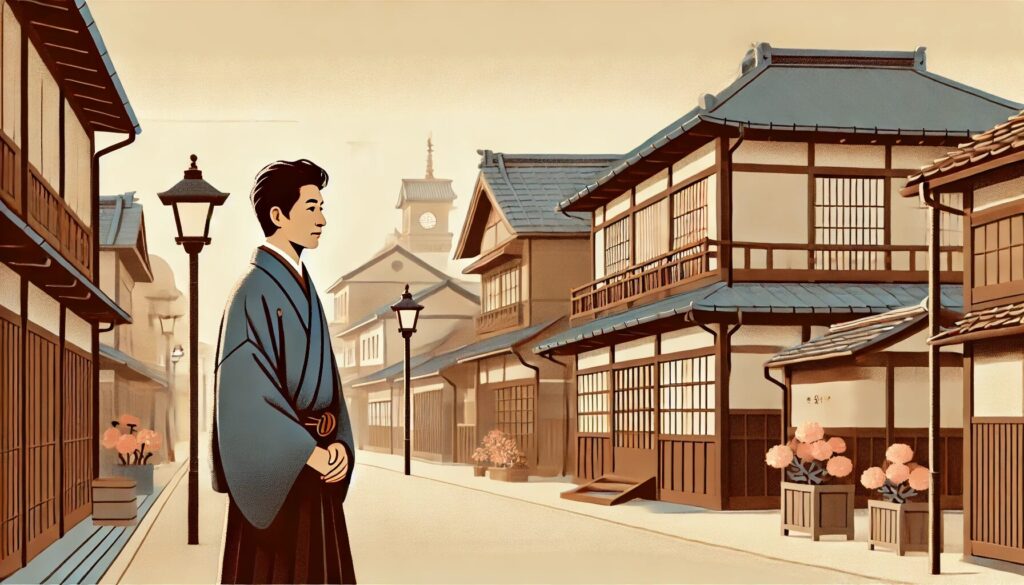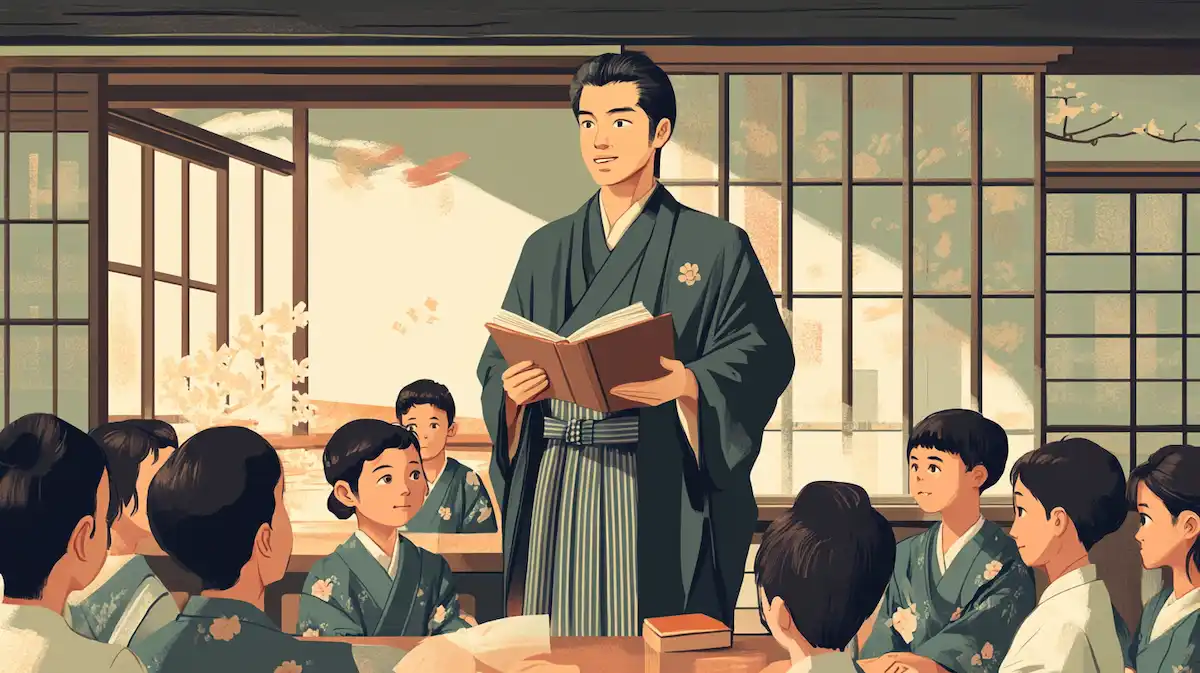福沢諭吉を英語で説明・紹介するための基本情報と、英会話に役立つ表現をシンプルでわかりやすい英語で紹介します。
英会話ダイアローグ・関連情報・10の質問を通して、福沢諭吉に関する英語表現を学びます。
英語
英会話ダイアローグを読む前に知っておくと良い前提知識と情報です。
- 福沢諭吉の生涯と業績
- 明治時代の著名な思想家、教育者、および慶應義塾(現:慶應義塾大学)の創設者
- 日本の近代化と西洋文明の導入に大きな影響を与えた人物
- 福沢諭吉の主な思想
- 「独立自尊」の理念 – 個人の自立と自尊心を重視
- 実学重視の教育観 – 実践的な知識と技術の習得を重視
- 西洋文明の積極的な取り入れ – 日本の近代化のためには西洋の優れた制度や技術を学ぶ必要があると主張
- 福沢諭吉の主な著作
- 「学問のすゝめ」 – 実学重視の教育哲学を説いた代表作
- 「西洋事情」 – 欧米諸国の文化や制度を紹介
- 「文明論之概略」 – 西洋文明の本質と日本の近代化への示唆を論じた著作
- 福沢諭吉の業績と影響
- 慶應義塾(現:慶應義塾大学)の創設 – 実学主義の教育を実践
- 新聞「時事新報」の創刊 – 啓蒙的な論説を発表
- 1万円札の肖像画に採用されるなど、日本近代史における重要人物として広く知られている
2人が福沢諭吉について話しています。
福沢諭吉の「独立自尊」の精神や実学を重視した教育理念、慶應義塾の創立、西洋文化の導入などを話題にしています。
会話 / dialogue

Key, I’ve been reading about Yukichi Fukuzawa, and he sounds fascinating. I’d love to learn more about him.

He’s definitely a remarkable figure in Japanese history. Fukuzawa had a big role in Japan’s modernization during the Meiji era. What caught your interest?

I like that he emphasized “independence and self-respect.” It sounds like he believed that people and Japan itself should be strong and self-reliant.

Exactly. His philosophy of “independence and self-respect” was about individuals and Japan as a whole standing on their own, without relying on others. He thought this mindset was essential for Japan to grow and modernize.

That makes sense. Did he always have these ideas, or did he experience something that changed his views?

Good question. Fukuzawa’s travels were a big influence. He visited the U.S. and Europe and saw the advancements there—things like technology, education, and government systems. He realized Japan could benefit by learning from the West.

So, he brought those ideas back to Japan?

Yes, and he shared what he learned in a famous book, An Encouragement of Learning. In it, he explained that knowledge and education were key to personal growth and a better society. Many people were inspired by his ideas to pursue education.

I like that! He seems to have focused on practical education. I read he founded Keio University with that idea.

Yes, he started Keio Gijuku, which became Keio University. He wanted students to learn skills that would be useful in the real world, like Western sciences, languages, and business. Even today, Keio is known for this “practical learning” approach.

That’s amazing—he didn’t just talk about ideas; he actually took action. It’s rare to see such commitment.

True, Fukuzawa was a man of action. Beyond education, he also wrote and spoke about Western culture, encouraging Japan to learn from it and modernize. He wasn’t just a thinker; he actively worked to change society.

And I heard his influence was recognized—he was on the 10,000-yen bill, right?

Yes, for many years, he was the face of the 10,000-yen note. It shows just how respected he is as a historical figure in Japan.

It sounds like his ideas went beyond just his time. How are his ideas still relevant?

Well, his ideas on self-reliance and education are still core values in Japanese society. People still admire the concept of “independence and self-respect” as essential for personal and national growth.

I see why. He seems like a true pioneer, bringing in new knowledge to help Japan build a future. I’d love to know more about his views on Western culture.

He was open-minded about Western knowledge but also believed Japan should keep its unique identity. He thought Japan could learn from the West without losing its own culture.

That’s a balanced view. He sounds like someone who valued both tradition and progress.

Exactly. Fukuzawa had a clear vision for Japan’s future, but he didn’t just accept everything from the West. He wanted Japan to adopt only what would help it grow independently.

That must have been a bold stance back then. I’d like to visit Keio University sometime—it would be great to see where his ideas continue to influence students.

You should! Keio still honors his philosophy and promotes the practical, real-world learning he believed in. It’s a great place to feel his legacy.

Thanks, Key. I feel like I understand Fukuzawa’s impact on Japan much better now. His ideas on education and independence are so inspiring.

I’m glad! Fukuzawa really left a lasting legacy. His life is a powerful example of how knowledge and action can change society.
関連情報 / related information
「福沢諭吉」について、理解を深めるための「英語での関連情報」です。
福沢諭吉

Who Was Yukichi Fukuzawa?
Yukichi Fukuzawa (1835-1901) was a Japanese thinker, educator, and writer who helped modernize Japan. He lived during the Meiji era, a time of big changes in Japan, when the country opened to the West after centuries of isolation. Fukuzawa is famous for his ideas on independence and self-respect, which he believed were essential for Japan to grow strong and modern.
“Independence and Self-Respect”
Fukuzawa’s philosophy of “independence and self-respect” meant that both individuals and Japan as a nation should stand on their own without relying on others. He thought that Japanese people should learn and grow through their own efforts. This idea encouraged many Japanese to seek education and improve themselves.
Education and Keio University
Fukuzawa valued practical education, or “learning by doing,” and he founded Keio University to promote this. He wanted students to gain skills useful in real life, like science, languages, and business. Keio University is still one of Japan’s top private universities today and continues to honor Fukuzawa’s vision.
Legacy and Influence
Fukuzawa’s influence remains strong in Japan. His image was even on the previous 10,000-yen note, showing his importance. His ideas on self-reliance and practical learning are still respected in Japan, and his life is a symbol of how knowledge and action can change society.
10の質問 / 10 questions
「福沢諭吉」について、理解を深めるための「英語での10の質問」です。
1: Who was Yukichi Fukuzawa?
Yukichi Fukuzawa was a Japanese thinker, educator, and writer who played an important role in Japan’s modernization during the Meiji era.
2: What are some of Fukuzawa’s famous ideas?
Fukuzawa is known for promoting “independence and self-respect.” He believed that people and Japan as a country should be self-reliant and stand on their own.
3: Why did Fukuzawa believe in “independence and self-respect”?
He thought that for Japan to become a strong, modern nation, it needed to rely on its own efforts instead of depending on other countries.
4: What is the book An Encouragement of Learning about?
An Encouragement of Learning is a book by Fukuzawa that teaches the importance of education and knowledge for personal and social growth.
5: Why did Fukuzawa promote education?
Fukuzawa believed that education was the key to a better society, and he encouraged people to learn practical skills useful in real life.
6: What type of education did Fukuzawa value?
He valued “practical education,” focusing on skills like science, language, and business that could be applied in real life.
7: What is Keio University, and how is it related to Fukuzawa?
Keio University is a famous private university in Japan. Fukuzawa founded it to promote practical learning and prepare students for the modern world.
8: How did Fukuzawa view Western culture?
Fukuzawa was open to learning from Western culture and thought Japan could benefit from Western knowledge while keeping its own traditions.
9: Why is Fukuzawa’s face on the previous 10,000-yen bill?
Fukuzawa was honored on the previous 10,000-yen bill because of his great contributions to Japan’s education and modernization.
10: How is Fukuzawa’s influence still felt in Japan today?
Fukuzawa’s ideas about self-reliance and practical learning are still respected, and his legacy lives on through education and modern Japanese values.

和訳付
会話 / dialogue

Key, I’ve been reading about Yukichi Fukuzawa, and he sounds fascinating. I’d love to learn more about him.
キー、福沢諭吉について読んでたんだけど、すごく興味深い人物だね。もっと知りたいな。

He’s definitely a remarkable figure in Japanese history. Fukuzawa had a big role in Japan’s modernization during the Meiji era. What caught your interest?
彼は間違いなく日本の歴史において特別な存在だよ。明治時代に日本の近代化に大きく貢献したんだ。どこが気になったの?

I like that he emphasized “independence and self-respect.” It sounds like he believed that people and Japan itself should be strong and self-reliant.
「『独立自尊』っていう考え方がいいなって思った。個人も日本も強く、自立しているべきだと考えていたみたいだね。

Exactly. His philosophy of “independence and self-respect” was about individuals and Japan as a whole standing on their own, without relying on others. He thought this mindset was essential for Japan to grow and modernize.
その通り。『独立自尊』っていうのは、個人も日本全体も他に頼らずに自立することなんだ。この考え方が、日本が成長し、近代化するために重要だと彼は考えていたんだよ。

That makes sense. Did he always have these ideas, or did he experience something that changed his views?
なるほどね。彼はずっとそういう考えだったの?それとも、何か経験があって考えが変わったのかな?

Good question. Fukuzawa’s travels were a big influence. He visited the U.S. and Europe and saw the advancements there—things like technology, education, and government systems. He realized Japan could benefit by learning from the West.
いい質問だね。福沢が影響を受けたのは、彼の海外経験が大きいんだ。アメリカやヨーロッパに行って、技術や教育、政治システムなどの進歩を見て、日本も西洋から学ぶことで成長できると気づいたんだよ。

So, he brought those ideas back to Japan?
それで、その考えを日本に持ち帰ったんだね?

Yes, and he shared what he learned in a famous book, An Encouragement of Learning. In it, he explained that knowledge and education were key to personal growth and a better society. Many people were inspired by his ideas to pursue education.
そうなんだ。そして、その学びを『学問のすゝめ』という有名な本で伝えたんだ。その中で、知識と教育が個人の成長やより良い社会のために重要だと説明して、多くの人がその考えに影響を受けて学ぶようになったんだよ。

I like that! He seems to have focused on practical education. I read he founded Keio University with that idea.
いいね!彼は実践的な教育を大事にしていたみたいだね。慶應義塾をその考えで創設したって読んだよ。

Yes, he started Keio Gijuku, which became Keio University. He wanted students to learn skills that would be useful in the real world, like Western sciences, languages, and business. Even today, Keio is known for this “practical learning” approach.
その通り。彼は慶應義塾を設立して、そこから慶應義塾大学が生まれたんだ。彼は学生たちに、実生活で役立つスキル、例えば西洋の科学や言語、ビジネスを学んでほしかったんだ。今でも、慶應はこの『実学』のアプローチで有名だよ。

That’s amazing—he didn’t just talk about ideas; he actually took action. It’s rare to see such commitment.
すごいね、ただアイデアを語るだけじゃなくて、実際に行動してたんだ。こんなに実行力のある人って珍しいよね。

True, Fukuzawa was a man of action. Beyond education, he also wrote and spoke about Western culture, encouraging Japan to learn from it and modernize. He wasn’t just a thinker; he actively worked to change society.
そうだね、福沢は行動の人だったんだ。教育だけでなく、西洋文化についても書いたり話したりして、日本がそれを学んで近代化するように促していたんだ。彼はただの思想家じゃなくて、実際に社会を変えようと活動していたんだよ。

And I heard his influence was recognized—he was on the 10,000-yen bill, right?
それで彼の影響力が評価されて、1万円札に肖像が使われたんだよね?

Yes, for many years, he was the face of the 10,000-yen note. It shows just how respected he is as a historical figure in Japan.
そうだよ。長い間、彼は1万円札に描かれていたんだ。それだけ彼が日本の歴史的人物として尊敬されているってことだね。

It sounds like his ideas went beyond just his time. How are his ideas still relevant?
彼の考えってその時代だけじゃなくて、今でも価値があるんだね。今の時代にも彼の考え方が生きているのかな?

Well, his ideas on self-reliance and education are still core values in Japanese society. People still admire the concept of “independence and self-respect” as essential for personal and national growth.
そうだね。彼の自立と教育に関する考え方は、今でも日本社会の大切な価値観になっているよ。『独立自尊』という考え方は、個人や国家の成長に欠かせないものとして今でも尊重されているんだ。

I see why. He seems like a true pioneer, bringing in new knowledge to help Japan build a future. I’d love to know more about his views on Western culture.
なるほどね。彼は本当に先駆者だったんだね。新しい知識を日本に取り入れて、未来を築こうとしたんだ。彼の西洋文化に対する考え方についてもっと知りたいな。

He was open-minded about Western knowledge but also believed Japan should keep its unique identity. He thought Japan could learn from the West without losing its own culture.
彼は西洋の知識に対してオープンだったけど、日本は独自の文化を保つべきだとも考えていたんだ。日本は西洋から学べるけど、自分たちの文化を失わないようにしなければならないとね。

That’s a balanced view. He sounds like someone who valued both tradition and progress.
バランスの取れた考え方だね。彼は伝統と進歩の両方を大事にしていた人みたいだ。

Exactly. Fukuzawa had a clear vision for Japan’s future, but he didn’t just accept everything from the West. He wanted Japan to adopt only what would help it grow independently.
その通り。福沢は日本の未来について明確なビジョンを持っていたけど、西洋から何でも受け入れるわけじゃなかったんだ。日本が自立して成長するために必要なものだけを取り入れるべきだと考えていたんだ。

That must have been a bold stance back then. I’d like to visit Keio University sometime—it would be great to see where his ideas continue to influence students.
当時としてはかなり大胆な立場だったんだろうね。いつか慶應大学を訪れてみたいな。彼の考えが今でも学生たちに影響を与えている場所を見られたら素敵だろうね。

You should! Keio still honors his philosophy and promotes the practical, real-world learning he believed in. It’s a great place to feel his legacy.
ぜひ行ってみて!慶應は今でも彼の哲学を大切にしていて、実生活に役立つ実学を教えているんだ。彼の遺産を感じられる場所だよ。

Thanks, Key. I feel like I understand Fukuzawa’s impact on Japan much better now. His ideas on education and independence are so inspiring.
ありがとう、キー。福沢が日本に与えた影響がもっとよくわかった気がするよ。彼の教育と自立の考え方は本当に刺激的だね。

I’m glad! Fukuzawa really left a lasting legacy. His life is a powerful example of how knowledge and action can change society.
そう言ってもらえて嬉しいよ!福沢は本当に長く続く遺産を残したんだ。知識と行動が社会を変えられるっていう強い例だね。
関連情報 / related information
福沢諭吉

Who Was Yukichi Fukuzawa?
Yukichi Fukuzawa (1835-1901) was a Japanese thinker, educator, and writer who helped modernize Japan. He lived during the Meiji era, a time of big changes in Japan, when the country opened to the West after centuries of isolation. Fukuzawa is famous for his ideas on independence and self-respect, which he believed were essential for Japan to grow strong and modern.
福沢諭吉(1835年〜1901年)は、日本の近代化を助けた思想家、教育者、そして作家でした。彼は、何世紀もの孤立の後、日本が西洋に開かれた時代である明治時代に生きました。福沢は「独立自尊」の考えで有名で、これが日本が強く近代的になるために重要だと考えていました。
“Independence and Self-Respect”
Fukuzawa’s philosophy of “independence and self-respect” meant that both individuals and Japan as a nation should stand on their own without relying on others. He thought that Japanese people should learn and grow through their own efforts. This idea encouraged many Japanese to seek education and improve themselves.
福沢の「独立自尊」の哲学は、個人も日本という国家も他に頼らずに自立するべきだという意味でした。彼は、日本人が自らの努力で学び成長すべきだと考えていました。この考えは多くの日本人に教育を求め、自己を高めるように促しました。
Education and Keio University
Fukuzawa valued practical education, or “learning by doing,” and he founded Keio University to promote this. He wanted students to gain skills useful in real life, like science, languages, and business. Keio University is still one of Japan’s top private universities today and continues to honor Fukuzawa’s vision.
福沢は実践的な教育、つまり「実際にやって学ぶ」ことを重視し、この考えを広めるために慶應義塾大学を設立しました。彼は学生に、科学、言語、ビジネスなど実生活で役立つスキルを身につけてほしいと願っていました。現在も慶應義塾大学は日本の有名な私立大学の一つであり、福沢の理念を尊重し続けています。
Legacy and Influence
Fukuzawa’s influence remains strong in Japan. His image was even on the previous 10,000-yen note, showing his importance. His ideas on self-reliance and practical learning are still respected in Japan, and his life is a symbol of how knowledge and action can change society.
福沢の影響は今も日本で強く残っています。彼の肖像は以前の1万円札にも使用されており、その重要性が示されています。彼の自立と実践的な学びに関する考え方は今も日本で尊重されており、彼の人生は知識と行動が社会を変えることができるという象徴です。
10の質問 / 10 questions
1: Who was Yukichi Fukuzawa?
福沢諭吉とは誰ですか?
Yukichi Fukuzawa was a Japanese thinker, educator, and writer who played an important role in Japan’s modernization during the Meiji era.
福沢諭吉は、明治時代に日本の近代化に大きな役割を果たした日本の思想家、教育者、作家です。
2: What are some of Fukuzawa’s famous ideas?
福沢の有名な考え方は何ですか?
Fukuzawa is known for promoting “independence and self-respect.” He believed that people and Japan as a country should be self-reliant and stand on their own.
福沢は「独立自尊」を推奨したことで知られています。彼は、人々や日本という国が自立し、自分自身で立つべきだと考えていました。
3: Why did Fukuzawa believe in “independence and self-respect”?
なぜ福沢は「独立自尊」を信じていたのですか?
He thought that for Japan to become a strong, modern nation, it needed to rely on its own efforts instead of depending on other countries.
彼は、日本が強く近代的な国家になるためには、他国に頼るのではなく自国の努力に依存する必要があると考えていました。
4: What is the book An Encouragement of Learning about?
『学問のすゝめ』はどのような本ですか?
An Encouragement of Learning is a book by Fukuzawa that teaches the importance of education and knowledge for personal and social growth.
『学問のすゝめ』は、福沢が書いた本で、個人や社会の成長にとって教育と知識が重要であることを教えています。
5: Why did Fukuzawa promote education?
なぜ福沢は教育を推奨したのですか?
Fukuzawa believed that education was the key to a better society, and he encouraged people to learn practical skills useful in real life.
福沢は、教育がより良い社会への鍵であると考え、実生活で役立つ実践的なスキルを学ぶよう人々に勧めました。
6: What type of education did Fukuzawa value?
福沢はどのような教育を重視しましたか?
He valued “practical education,” focusing on skills like science, language, and business that could be applied in real life.
彼は「実学」を重視し、科学、言語、ビジネスのような実生活で役立つスキルに注目しました。
7: What is Keio University, and how is it related to Fukuzawa?
慶應義塾大学とは何で、福沢との関係は何ですか?
Keio University is a famous private university in Japan. Fukuzawa founded it to promote practical learning and prepare students for the modern world.
慶應義塾大学は日本の有名な私立大学です。福沢は実学を広め、学生を現代社会に備えさせるためにこの大学を創設しました。
8: How did Fukuzawa view Western culture?
福沢は西洋文化をどのように見ていましたか?
Fukuzawa was open to learning from Western culture and thought Japan could benefit from Western knowledge while keeping its own traditions.
福沢は西洋文化から学ぶことに前向きで、日本が独自の伝統を守りながら西洋の知識から利益を得られると考えていました。
9: Why is Fukuzawa’s face on the previous 10,000-yen bill?
なぜ福沢の肖像が以前の1万円札に使われたのですか?
Fukuzawa was honored on the previous 10,000-yen bill because of his great contributions to Japan’s education and modernization.
福沢は日本の教育と近代化に多大な貢献をしたため、以前の1万円札に彼の肖像が使われました。
10: How is Fukuzawa’s influence still felt in Japan today?
福沢の影響は今日の日本でどのように感じられますか?
Fukuzawa’s ideas about self-reliance and practical learning are still respected, and his legacy lives on through education and modern Japanese values.
福沢の自立と実学に関する考え方は今でも尊重されており、彼の遺産は教育や現代の日本の価値観に受け継がれています。

words & phrases
英会話ダイアローグと関連情報に出てきた単語・フレーズです(例文は各3つ)。

self-respect : 名詞
意味: 自尊心。自分自身を尊重すること。Respect for oneself and confidence in one’s worth or abilities.
(福沢諭吉が強調した、他に依存せず自立するために必要な自尊心を指す)
例文:
- Developing self-respect is essential for personal growth.
「自尊心を育てることは個人の成長に欠かせません。」 - He teaches students the importance of self-respect.
「彼は学生に自尊心の重要性を教えています。」 - A sense of self-respect can help people face challenges.
「自尊心は人々が困難に立ち向かう助けとなります。」
self-reliant : 形容詞
意味: 自立している、自己に頼ること。Able to rely on oneself and manage independently without help from others.
(福沢諭吉が主張した、個人や国が他に頼らずに立つべきだという思想を指す)
例文:
- She became more self-reliant after living abroad.
「彼女は海外生活を経てより自立しました。」 - Self-reliant people often take responsibility for their own actions.
「自立している人々は自分の行動に責任を持つことが多いです。」 - The goal of the program is to make students self-reliant.
「このプログラムの目標は学生を自立させることです。」
mindset : 名詞
意味: 考え方、思考態度。A fixed mental attitude or way of thinking about something.
(「独立自尊」の考え方を持つことが、福沢の強調した「mindset」であり、日本の近代化に必要な思考様式を指す)
例文:
- A positive mindset helps in overcoming obstacles.
「前向きな考え方は障害を克服するのに役立ちます。」 - Changing one’s mindset can lead to new opportunities.
「考え方を変えることが新しい機会につながることがあります。」 - She has a mindset focused on continuous learning.
「彼女は継続的な学びに焦点を当てた考え方を持っています。」
pursue : 動詞
意味: 追求する、目指す。To follow or seek to attain or accomplish a goal or objective.
(福沢が教育と知識の重要性を説き、多くの人に教育を追求するように勧めたことを指す)
例文:
- He decided to pursue a career in education.
「彼は教育の分野でのキャリアを追求することを決めました。」 - She is pursuing her dream of becoming an artist.
「彼女はアーティストになる夢を追いかけています。」 - They worked hard to pursue their goals.
「彼らは目標を達成するために一生懸命に働きました。」
relevant : 形容詞
意味: 関連がある、適切な。Closely connected or appropriate to what is being discussed or considered.
(福沢諭吉の「独立自尊」の考えが今でも日本社会で適切である、という意味で使われる)
例文:
- The skills learned in school are still relevant in today’s job market.
「学校で学んだスキルは、今日の就職市場でも依然として関連性があります。」 - It’s important to keep information relevant to the topic.
「話題に関連した情報を維持することが重要です。」 - His experience is highly relevant to this project.
「彼の経験はこのプロジェクトに非常に適しています。」
